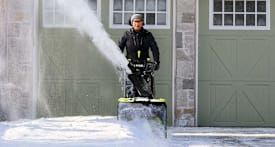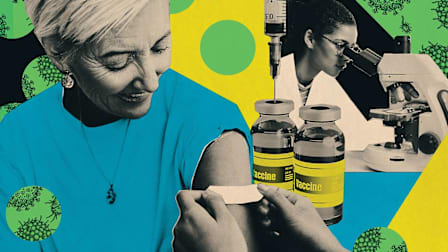4 Vaccines You Might Need Right Now
These shots will help safeguard you from RSV, the flu, COVID-19, and pneumonia throughout the winter

Along with the chilly weather of the fall comes the inevitable wave of seasonal viruses that make up cold and flu season. That means that if you haven’t gotten vaccines already, it’s time to put them on your to-do list.
But which ones should you get? This year marks the second season for the new respiratory syncytial virus vaccine (RSV) for grown-ups. While not everyone needs it, the evidence so far suggests that it’s highly effective at preventing serious illnesses from RSV in older adults, according to Edward Walsh, MD, a professor of medicine at the University of Rochester in New York.
“This is a valuable vaccine that keeps people who are at high risk out of trouble and reduces significantly the hospitalization rates and complication rates of this infection,” he says.
People at high risk from RSV include not just older adults but also babies. Fortunately, RSV vaccines are now approved for pregnant people, too, and a new immunization is available for infants.
Then there’s the latest COVID-19 shot, a brand-new vaccine against bacteria that cause pneumonia, and, of course, the seasonal flu vaccine. Here are the shots you need to get this fall and why they’re so important.
The New RSV Vaccine
RSV is a respiratory virus that usually causes mild, coldlike symptoms but can be severe and even deadly for older adults and infants.
Data indicates that about 8 to 10 percent of all hospitalizations for acute respiratory illnesses are due to RSV in older people, according to Angela Branche, MD, an infectious disease physician and an associate professor of medicine at the University of Rochester in New York.
“RSV is definitely an underappreciated cause of severe respiratory outcomes in older adults,” says Sara Tartof, PhD, a research scientist and epidemiologist with Kaiser Permanente Southern California. According to the Centers for Disease Control and Prevention, 60,000 to 160,000 older adults are hospitalized with RSV each year, and 6,000 to 10,000 die from it.
As many as 80,000 children under age 5 are hospitalized with RSV every year, too, the CDC says.
Your Annual Flu Shot
“This is a really good year to get vaccinated,” Branche says. “Some people are probably several years from their last infection and maybe even their last vaccine.”
The CDC estimates that last year’s flu caused as many as 830,000 hospitalizations and 25,000 to 72,000 deaths. Older adults and children under 5 are among those most at risk for severe flu.
People 65 and older should look for one of the three vaccines recommended for them: Fluzone High-Dose Quadrivalent, Fluad Quadrivalent, and Flublok Quadrivalent. (If you can’t find them, get the regular flu shot.)
Who should get one: Unless you have certain rare allergies, a flu shot is recommended for all adults every year and for children 6 months and older.
Effectiveness: During the last flu season, the flu vaccine was about 42 percent effective; in 2022 to 2023, it was about 30 percent effective. Data shows that in general, the vaccines recommended for people ages 65 and up are more potent than the regular flu shot. “In these older populations, they work about 20 percent better than the standard vaccine,” says William Schaffner, MD, an infectious disease specialist at Vanderbilt University Medical Center in Nashville, Tenn.
And although it’s difficult to predict which flu strains will be most prominent in the coming season—leaving open the possibility that the yearly vaccine may not be a great match—getting the shot can still reduce your risk of serious consequences, like hospitalization, if you do get sick.
An Updated COVID-19 Shot
COVID-19 variants are evolving all the time, and the ones circulating this fall are quite different from those that were with us at this time last year.
That means past versions of the vaccine may offer very little protection today, Tartof says. “You can almost consider yourself unvaccinated, from an immunologic perspective” if you got one of the previous boosters, she says. The shots newly approved in August are a better match for the strains of COVID-19 that are currently circulating.
Who should get one: Everyone 6 months and older.
Keep in mind that “the greatest benefit is for people at increased risk for severe COVID-19 with respect to hospitalizations and deaths,” says Jeffrey Duchin, MD, a professor emeritus of medicine in the division of infectious diseases at the University of Washington. That means adults 65 and older and people with underlying medical conditions or weak immune systems.
For this reason, the CDC has also recommended a second dose of the newly updated (2024-2025) COVID-19 vaccine for people who are 65 and older and who are moderately to severely immunocompromised, to be timed at six months after their first dose.
Effectiveness: Data from past boosters suggests protection against serious COVID-19 may initially be as high as 70, 80, or 90 percent, according to Schaffner. “A lot depends on how vigorous your immune system is,” he says. But that protection does wane over the months following vaccination.
The Latest Pneumonia Shot
PCV21, the latest pneumococcal conjugate vaccine, was approved earlier this year. It protects against 21 strains of pneumococcal bacteria and helps prevent pneumonia and other diseases caused by pneumococcal bacteria.
Who should get one: Pneumococcal vaccines are recommended for all adults ages 50 and older. Ask your doctor which pneumococcal vaccine you need, if any. What’s right for you will depend on which ones you’ve had and when you got them.
Effectiveness: PCV21 is new enough that real-world efficacy data isn’t available. But clinical trials show it prompted an immune response comparable to earlier versions of this vaccine. Studies show that this type of pneumococcal vaccine is moderately effective at preventing common types of bacterial pneumonia, and it’s even more effective at preventing serious infections from those strains. And these one-time shots may have extra benefits. A recent study published in the Journal of Infectious Diseases found that this type of pneumococcal vaccine can also help to reduce the risk of getting infected with SARS-CoV-2, the cause of COVID-19.
Editor’s Note: A version of this article also appeared in the November 2023 issue of Consumer Reports on Health. It has been updated with information that appeared in the November 2024 issue of Consumer Reports on Health.




















